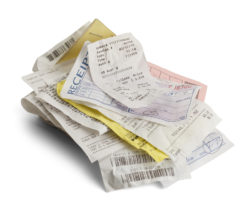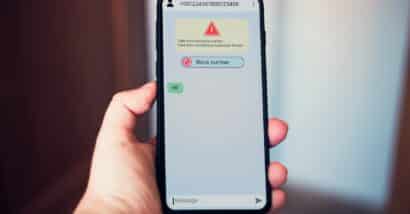 The Fair and Accurate Credit Transactions Act (FACTA) prohibits the printing of a full credit card number on a receipt.
The Fair and Accurate Credit Transactions Act (FACTA) prohibits the printing of a full credit card number on a receipt.
FACTA was enacted in 2003 to help consumers combat identity theft and credit card fraud. If anything other than the last five digits of a card number appear on an electronically printed receipt, the merchant could be held accountable for violating the federal law.
Following FACTA rules helps prevent would-be fraudsters from putting together fully identifiable information from a receipt. When you look at a receipt and see asterisks or other symbols prior to the last five or fewer digits of your credit card, you are seeing the “truncated” card number. This protects you from identity theft in the event the receipt ends up in the wrong hands.
If your full credit card number on a receipt is printed, the retailer is in violation of FACTA laws. Any cash register, self-service kiosk, or other electronically generated receipt must follow the federal law.
Full Credit Card Number on a Receipt Prohibited
As concerns about identity theft and credit card theft increase, it becomes more important to check every receipt to make sure your full credit card number on a receipt is not printed for all to see. Not only should you be wary of the full credit card number on a receipt, but also make sure the expiration date is not visible.
According to Pew Research Center in a study published in January 2017, nearly 41 percent of Americans have reported seeing fraudulent charges on their credit cards.
Outdated electronic registers might not be FACTA compliant. Electronic systems that have undergone updates might be out of FACTA compliance as well. Even if you shop at the same stores all the time, you still should look over your receipts after every visit.
Before FACTA became enacted, a full credit card number on a receipt was often accompanied by the expiration date. Fraudsters would dumpster-dive to collect receipts with all of that information literally at their fingertips.
Subway Settles $30.9 Million FACTA Class Action Case
In March of this year, Subway agreed to a $30.9 million settlement after the company violated FACTA by printing the full expiration dates of customer’s credit cards on their receipts. Nearly 2.6 million customers who made Subway purchases since Jan. 1, 2016 could be eligible for a portion of the settlement money.
Retailers who violate FACTA laws can be penalized with fines between $100 and $1,000 per transaction. Any merchant who is found to have willfully violated the law will face more substantial penalties.
If you have been handed a receipt that includes the card’s expiration date or more than the last five digits of the credit card number, you could be eligible to file a lawsuit over FACTA violations.
Free FACTA Class Action Lawsuit Investigation
If you made one or more purchases and the retailer provided you with a receipt that contained more than the last five digits of your credit or debit card number or the expiration date, you may be eligible for a free class action lawsuit investigation and to pursue compensation for these FACTA violations.
ATTORNEY ADVERTISING
Top Class Actions is a Proud Member of the American Bar Association
LEGAL INFORMATION IS NOT LEGAL ADVICE
Top Class Actions Legal Statement
©2008 – 2025 Top Class Actions® LLC
Various Trademarks held by their respective owners
This website is not intended for viewing or usage by European Union citizens.














